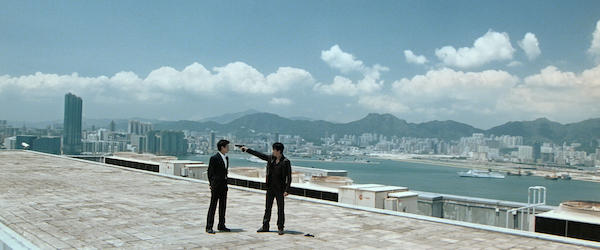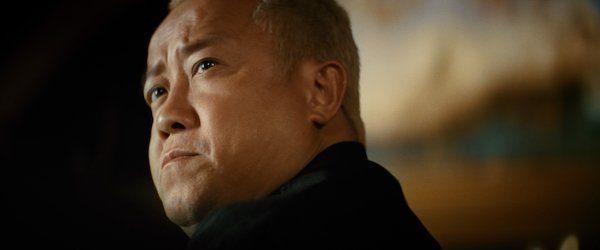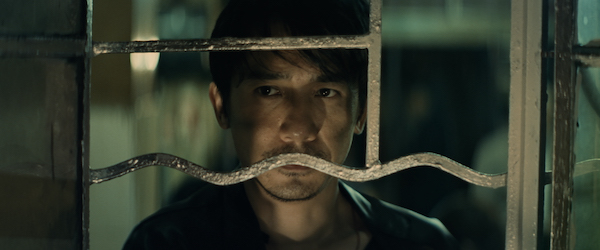
You may know Infernal Affairs even if you’ve never seen it. The plot to the 2002 Hong Kong movie formed the basis for The Departed, to date Martin Scorsese’s only directing Oscar.
Recently restored by L’Immagine Ritrovata, all three entries in the original trilogy screen starting September 16 at Film Society at Lincoln Center. Directed by Andrew Lau Wai-keung and Alan Mak, they are the high-water mark in Hong Kong cinema over the past two decades, the gold standard for their direction, writing, and acting.
The plot pits two undercover agents — one a police officer posing as a gangster, the other a triad member who infiltrates the police — against each other. Moles have often been employed as plot points in crime films, like White Heat and Point Break. The innovation here was to mirror the two informants like yin and yang. Each has elements of the foe he pursues. Each has to betray his beliefs to carry out his mission. Each becomes lost between good and evil.
The script — by Alan Mak and Felix Chong — attracted the industry’s biggest stars. In fact, this kind of talent had rarely been seen together before. Andy Lau, a Cantopop heart-throb and romance icon, was Lau Kin-ming, a by-the-books policeman hiding a dark secret. Tony Leung Chiu-wai, a former TV actor shaped into a star by turns in Hard-Boiled and Bullet in the Head, took the part of gang mole Chan Wing-yan.
Leung spoke to me about summoning up past hurts, rejections, betrayals to play Chan. “When you think of how you’ve been hurt in the past, it’s not hard to bring those feelings to the scene,” he told me. In a startling scene, he responds wordlessly as Hon Sam, his boss and mentor smashes the cast on his arm, looking for proof that he is wearing a wire.

Triad Hon Sam boss is played by Eric Tsang, one of the series’ two secret weapons. (Tsang’s part was played by Jack Nicholson in The Departed. Arguably Tsang’s is the stronger, more coherent performance.) The roly-poly Tsang was a beloved TV host, the star and director of popular comedies, and a founding member of Cinema Cities, a studio that helped Tsui Hark, John Woo, and Ringo Lam find a foothold in the industry.
He plays Hon with a combination of affability and menace, a strategy that keeps his underlings off-balance.
“I’ve done many gangster roles. Comrades, Almost a Love Story, was my first, and I thought about that one for days. How can I be believable as a bad guy? Then I remembered a big brother figure, someone like me physically. Short, not too handsome, but with a great sense of humor. You would always hear him laughing. So I tried that.
“When I accepted the Hon Sam part, I said to myself, there must be a reason for me to do what I do. Why do I have someone killed in prison? Because he doesn’t deserve to be jailed, he deserves to be dead. So there’s always a reason to my character. Even though I commit hideous crimes, I feel I am doing the right thing.”
A director himself, Tsang introduced nuances to his Infernal Affairs that weren’t in the script.
“With the gangster element in Infernal Affairs, all the violence, I have to surprise viewers,” he said. “For instance, when I throw the rice plate in the police station, that wasn’t in the script. I brought that lunch box myself. I felt that by swiping it off the desk, it shows the viciousness of my character. That he’s not afraid of law enforcement.
“That scene where I break Leung’s cast — I wanted to do something unexpected, to shock the audience. Breaking his cast shows my fearlessness.”
Tsang’s counterpart in the story is Chong Chi-Shing, played by Anthony Wong. (Martin Sheen played a similar role in The Departed.) One of the cornerstones of the HK industry, Wong built a career in which he drew upon his Eurasian background to portray a series of villains and monsters in films like Hard-Boiled, The Heroic Trio, and the real-life cannibal tale The Untold Story.
He plays Chong with casual aplomb, tight-lipped, carefully dressed. In his scenes with Leung he pulls away from the other actor, uncomfortable with the informant’s uncontrolled emotions.
“Normally when actors play policemen, they act very powerful, exert authority,” he told me. “I played Chong a different way. My uncle was a policeman. To him it was only a job. So when I was Inspector Wong, it was only a job to him. I go to the office, I do the job, and then I go home. I played him like a banker, not a policeman.”
Wong has since appeared in a remarkably wide range of roles, from Johnnie To thrillers like Vengeance and real-life martial-arts teacher Ip Man to a Cantonese adaptation of The Normal Heart.
Lau started out as a cinematographer at the Shaw, eventually shooting significant films like Ringo Lam’s City on Fire and Wong Kar Wai’s feature debut As Tears Go By. By the 1990s he was directing the Young and Dangerous franchise and Sausalito, a Maggie Cheung vehicle. After Infernal Affairs he collaborated with Mak on the race car drama Initial D and Confessions of Pain, starring Tony Leung. Working solo, he directed Revenge of the Green Dragons, executive produced by Scorsese.

Cinematography and production design were key to Infernal Affairs. (Lau shared photography with Lai Yiu-fai.) Unlike most Hong Kong films of the time, shot with feverish colors on garish sets, Infernal Affairs unfolded in monotonous office towers, washed out tenements, barren storerooms. The palette featured steel greys and icy blues. Christopher Doyle, the “visual consultant,” helped refine how Lau and Lai would approach shooting.
Apart from its action, expertly staged by Dion Lam, and the enormous tension generated by the screenplay’s twists and reversals, Infernal Affairs is marked by its gravity. The entire series is permeated by a sense of destiny, of predestination, of the impossibility of escaping fate.
The Chinese title Mou gaan dou translates roughly as Infinite Way or Non-Stop Way, a reference to eternal hell. This concept propels all the characters in the story to their inescapable destiny. Life is an endless hell, as an opening title states.
Andrew Lau and Alan Mak did not set out to make a trilogy, but response to the first Infernal Affairs was so overwhelming that they put together both a prequel and sequel. Infernal Affairs II starred Edison Chan and Shawn Yue as younger informants, with Tsang and Wong reprising their roles. Infernal Affairs III puts the focus back on Leung and Lau, introducing Leon Lai as another police foil. They are superb additions to the first entry.
Do not miss this opportunity to see Hong Kong filmmaking at its peak.


